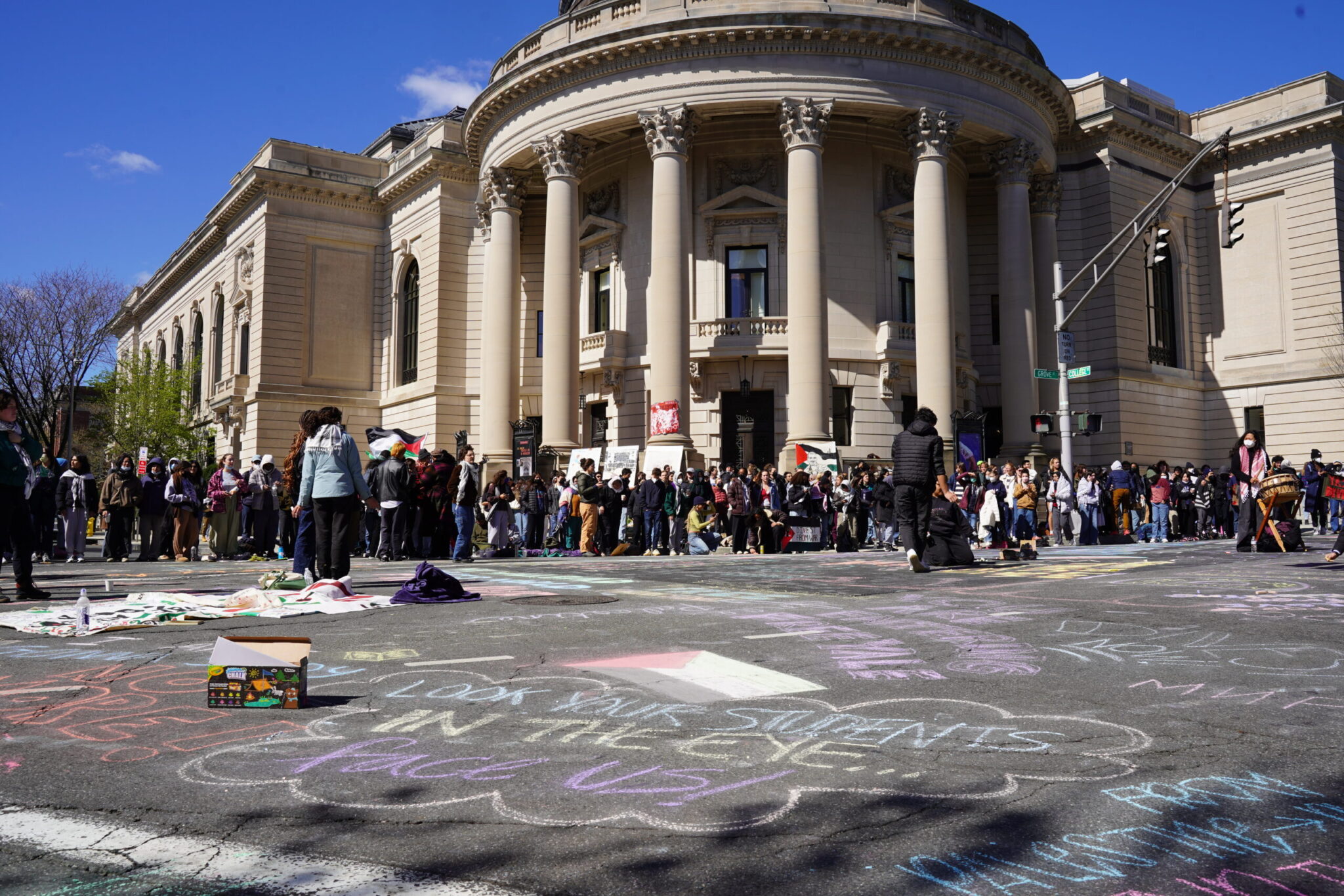Salovey addresses student arrests, threatens disciplinary action
In a Monday email, Yale President Peter Salovey wrote that the morning arrest of 47 pro-divestment student protesters encamped on Beinecke Plaza was because students did not heed administrators’ warnings.

Ellie Park, Photography Editor
University President Peter Salovey sent an email to the Yale community on Monday afternoon, after Yale police arrested 47 pro-Palestine student protesters early that morning on Beinecke Plaza.
Salovey wrote that Yale police officers gave protesters “several opportunities to leave and avoid arrest” and that he was “deeply saddened that the call for civil discourse and peaceful protest [he] issued” — referring to a separate email he sent on Sunday — was not heeded.
His described the current protest at the intersection of College and Grove streets as a “safety violation.” Salovey wrote that the University will pursue disciplinary action in response to the violation of policies, specifically those regarding threats, intimidation, coercion, harassment, physical violence and interference with University operations.
“Every news report and statement covering this week’s protests has emphasized their peaceful nature,” Angel Nwadibia ’25 wrote to the News in response to the email. “In fact, the first instance of violence was Yale’s decision to arrest its own students. It is disingenuous and dishonest for President Salovey to portray these protests as anything but peaceful.”
Chisato Kimura LAW ’25 told the News that protesters received one warning to leave the plaza this morning before police began arresting protesters.
New Haven Police Chief Karl Jacobson told the News earlier today that since the protest was on private property, University emails from earlier in the week outlining Yale’s policies on the use of outdoor space “count as warnings.”
“We determined that the situation was no longer safe. Members of the Jewish, Muslim, Israeli, Arab, and Palestinian communities reported that the campus environment had become increasingly difficult,” Salovey wrote on Monday. He pointed to the police reports “identifying harmful acts and threatening language used against individuals at or near the protest sites” and said that while “some of the aggressors” are believed to be Yalies, “others were outsiders.”
“It is also completely despicable to refer to New Haven community members as ‘aggressors’ and imply that their presence has made anyone less safe,” Nwadibia wrote in the statement from organizers, using language from Salovey’s email. “In reality, community engagement has brought safety and vibrance to our mobilization. We are utterly committed to building coalition with community members and we reject President Salovey’s ‘discrimination and prejudice’ against them.”
Yale police chief Anthony Campbell ’95 DIV ’09 wrote to the News that “there have been reports of both criminal activity as well as violent activity regarding the protest particularly in the last few days.” He added that such criminal activity “typically has to do with property issues” but also includes instances of disorderly conduct in which people have “prevented people from walking where they want to go.”
Jacobson told the News he has received no reports of violence today or at any time during the protests over the last week.
In his email, Salovey expressed gratitude that Yale Police was able to “take these actions peacefully” as he stated that “none of the protesters resisted arrest.”
On Saturday night, the News obtained a video of a student who draped an Israeli flag from a pro-Palestine art panel and then proceeded to shove a protester who grabbed the flag and threw it into Noguchi Sculpture Garden. However, the protests have largely remained peaceful throughout the three nights since protesters erected an encampment on Beinecke Plaza.
In the email, Salovey claimed that students “chose to end conversations with Yale College and graduate school deans and rejected this offer.” He referred to the University’s offer to protesters to meet two trustees, including the chair of the Board of Trustees’ Corporation Committee on Investor Responsibility.
“We told [the administration] we were willing to keep a peaceful encampment as Trustees assessed what, if any commitment, could be made to disclosure, and that we understood this could take time,” Patrick Hayes ’24, and organizer of the protest, told the News earlier. “We negotiated in good faith, but with no commitment to even assess disclosure of any kind, we could not accept the offer.”
Yale discloses less than 1 percent of its endowment investments.
According to Yale College Dean Pericles Lewis, the University has “a number of contractual obligations” that prevent disclosure.
This email comes after Salovey’s Sunday email emphasizing that protesters have been made clear of “university policies and guidelines, including the importance of maintaining open passageways in the event of a fire or other emergencies.”
He concluded his Monday message by saying that the University will “soon” remind the community of its policies on freedom of expression and outdoor spaces and added that the University will provide clarification on policy surrounding the building of structures on campus.
Zoë Halaban, Yurii Stasiuk, Yolanda Wang, Chris Tillen, Nathaniel Rosenberg, Karla Cortes, Kenisha Mahajan and Anika Arora Seth contributed reporting.







